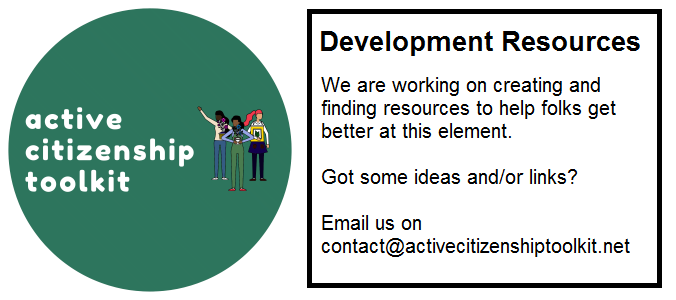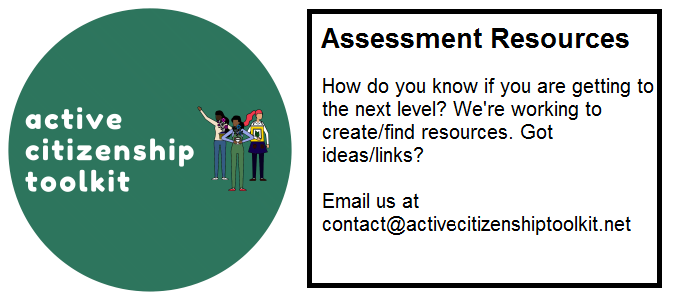Element Descriptor
We have favourite moves, our opponents have favourite moves – ones which have worked for them in the past and they feel very comfortable deploying. If you can’t learn their basic moves, they will roll you every time, without getting out of bed.
Level descriptors
| Novice | Practitioner | Expert | Ninja |
|---|---|---|---|
| You know the favourite basic moves of your opponents and how they are likely to deploy them. You have your countermeasures, painfully rehearsed, ready to go as and when required. | You know almost all of the moves of your opponents, including ones they have only used on other issues/circumstances. You have the capacity to respond intelligently and effectively to these moves, naming them as you go | You know their moves and those they are likely to try out soon. You know how to respond elegantly and quickly to these, rendering their plans to undermine you in tatters. You force them to innovate, and then learn how to defeat these innovations. | You are three and a half moves ahead of them all the time – you know how they will move their pieces, and you know how to slow them down, stop them, deploy your resources to best effect. |
Element Overview Essay
This is a draft. If something doesn’t make sense, or you see typos, or if you have further ideas, please email us on contact@activecitizenshiptoolkit.net
So the reasons nonhierarchical groups don’t do this better, I think is number one that it requires strategic thinking, and realising that you’re going to be in a multiple iteration game/conflict/interaction, rather than one heroic victory.
Number two, we just assume often, that the truth will set us free and that our moral superiority will win the day. Er… no.
Number three, we don’t like to think about the tactics of our opponents, perhaps because oftentimes, those tactics are very successful. And we shy away from the fact that in the past, we have been constantly not just outgunned, but outwitted and outmanoeuvred and rendered impotent
Nobody likes to feel impotent, they want to feel important, badoom Tish
The consequences of not understanding your opponent’s favourite tactics is that they never have to get out of first gear. They just keep on winning and winning and winning, on autopilot, which is kind of not sustainable, you know, for you or the species, other species, etc. and this will lead to demoralisation and decruitment. Of course, you still might lose even if you innovate and learn their ways, but at least you’ll have a little fun on the way and you never know what might happen.
So the fixes are to study your immediate principle opponents methods and to see them as part of an ongoing history, where they might be ignoring you for as long as they can so that you exhaust yourself, just getting to the start line, at which point you’re easy pickings for being co-opted into some meaningless consultative panel.
Or they might try to smear you. As you know, “the whatever lobby” or malcontents or communists or anti technology people or “middle-class lentil eaters who hate the poor.” There any number of ways that they can try and smear you.
Usually, once they’re forced to engage in debate with you, they’ll deliberately answer a different question, or they’ll set up a straw man. As a diversion, they’ll puff themelves up often with some irrelevant other project, or they’ll talk out the clock, or they’ll do whatever it takes to avoid scrutiny.
Or they will set up “sheep and goats” and they’ll find someone who is that desperate for attention or a sense of importance that they can be persuaded to be a fig leaf, to believe they are “changing the system from within” or stopping it being even worse.. So, there colonialism is full of examples of this. And the same tactics that were used in the colonies are of course used here. Why wouldn’t you? They work. So, if you don’t have a sense, finally, of what tactics are going to be deployed against you, you have no chance of devising effective countermeasures, and there’s no need for your opponents to innovate.
Specifically once you’re on a consultative panel or whatever, realise this
Bureaucrats will try to conceal information, or slow down the delivery of it until after a decision has been made.
So, there needs to be a code of conduct whereby the price of having your unpaid attendance at meetings (and remember, the bureaucrats are getting paid to be there), and the associated credibility that comes with that (organisations will say ‘we’re consulting’) is that the organisations have to commit to behave themselves – delivering what they say by when they say.
If there is going to be any delay in releasing information, this is communicated in advance, with an explanation for the delay given, a revised final date, and a commitment to not letting this reason cause slippage again.”
By writing reports in plain language, and without shifting the baseline against which progress is to be measured.
You could insist that reports are run through a “plain English” assessment tool (the web has plenty).
Bureaucrats will try to exhaust you and to demoralise those who care most about an issue
One way they will do this is to call too many or too few meetings, often at short notice.
Make sure the bureaucrats can’t call meetings at short notice when they know some ‘awkward squad’ people are not going to be able to attend.
Have regularly scheduled meetings, planned months in advance. Don’t let the bureaucrats cancel them just because “oh, important person x can’t come, so we’ve rescheduled for this Wednesday morning at 10am)
So, within any meeting, whenever there is a promise of delivery of information, get it agreed (and minuted) that
“Information about x is going to be delivered to everyone on this panel by date y in format z[ e.g. pdf] by named bureaucrat a. If this deadline is not met, it will be escalated to bureaucrat a’s boss, bureaucrat b.”
Inconvenient commitments getting mysteriously “forgotten” from the official minutes and “attritional evaporation”
If you’re only meeting once a month, it can often be the case that memories have faded, scraps of paper have been lost. The chair of the meeting says “can we take the minutes as read?” If you say “er, no, chair, there was I think a commitment that bureaucrat a would do x by y” then the bureaucrat or chair can smile and say “well, that’s not our recollection/it wasn’t there in the draft minutes”. Then it can become a bunfight about memory etc, and someone else will pitch in and say “look, can we just move on, we’ve got a packed agenda tonight and shouldn’t get bogged down in the detail.” And so a commitment that WAS made gets dropped, and this demoralises those who fought for it, and makes them more suspicious of the whole process. They then probably drop out, leaving ever-more-pliable people still on the committee… This is an attritional “evaporation” process.
What to do about it
Those attending the meeting have to write their OWN version of the minutes, and circulate that straight away.
“Hi, bureaucrats a and b,
Thanks for meeting with us earlier today/last night. Attached please find our minutes of the meeting, structured around a series of agreed actions, with named individuals and deadlines.
This is to the best of our ability an accurate account of what was agreed. If you feel that it was NOT, please let us know straight away. If we do not hear from you, we will regard this as an agreement that our account is in fact accurate.”
Yours sincerely
xxx”
Members of the community/student groups have to know how to use the Freedom of Information Act, and be willing to use it if the organisation plays silly-buggers.
Bureaucrats will try to “stack” panels with clueless and/or vulnerable people, to dilute the voices who are demanding proper action
You spot them – often people with no connections to everyone else on the panel who are employed directly or indirectly by the organisation, who make long vague speeches which then get enthusiastically backed up by the bureaucrats, wasting time and energy.
This is a tricky one to deal with, because you can get into fights about who is “representative” and of what which nobody wins, and the fight demoralises and delegitimises everyone. These sorts of people are best just “contained” – asked to keep their irrelevant comments brief etc.
Bureaucrats will try to baffle you with bullshit – long words and jargon, irrelevant factoids based on shifting-baselines, with inconvenient facts then lost in the data smog
Learn how to decode their language, but push for “plain language” in the code of conduct as well.
Rewrite their reports as short briefing papers, highlighting a) what has NOT been answered b) what has been buried and c) how much more succinctly and clearly the reports could have been written.
Bureaucrats will push important agenda items to the bottom, so there is less time to address substantive points and more time for ‘safe’ irrelevant/side issues.
Keep a close eye on the agenda, and demand as part of the initial “code of conduct” that agendas are a) always circulated a week in advance as DRAFTS, b) that there are mechanisms both before and at the start of the meeting for the agenda to be re-ordered c) that both the agenda-setting and chairing of the meeting is rotated between the organisation and those in attendance
Bureaucrats can play a long-game, waiting to “take back control”
Members of the community group have to continually explain other newer members as to the ways bureaucrats slow things down. Otherwise, as there is turn-over of membership in the panel, the bureaucrats can dust off old tricks and slowly return to their old power games…
Various popular reading on it
https://hbr.org/2016/07/how-to-stop-people-who-bog-things-down-with-bureaucracy
Development Resources

Assessment Resources

